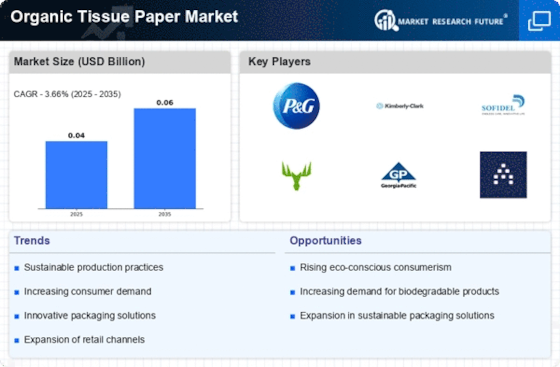Top Industry Leaders in the Organic Tissue Paper Market

Market share analysis within the Organic Tissue Paper industry entails considering crucial factors. Brand reputation, product quality, sustainability certifications, pricing strategies, and distribution networks significantly impact market positioning. Brands excelling in offering high-quality, certified organic tissue paper made from recycled or sustainable sources, ensuring softness and strength, secure a competitive edge. Additionally, factors like eco-labeling, eco-friendly packaging, and public commitments to sustainability influence market share.
New and emerging companies in the Organic Tissue Paper market often focus on niche aspects such as innovative packaging, unique textures, or specialty paper types. These emerging players leverage innovation in papermaking techniques, introduce specialized tissue varieties (such as tree-free or unbleached options), and emphasize direct-to-consumer models to appeal to environmentally conscious consumers seeking alternatives to conventional tissue paper. Moreover, they rely on digital marketing, e-commerce platforms, and collaborations with eco-friendly retailers to gain visibility and compete with established brands.
Industry news in the Organic Tissue Paper market revolves around sustainability initiatives, technological advancements, and consumer education. Brands are investing in research and development to explore alternative fibers, innovate in bleaching methods to reduce environmental impact, and improve biodegradability to address concerns about waste. Additionally, there's a notable emphasis on educating consumers about the environmental benefits of organic tissue paper through marketing campaigns and initiatives promoting sustainability in the paper industry.
Current investment trends within this market underscore a strong emphasis on sustainability, innovation, and consumer-centric strategies. Companies are investing in sustainable sourcing practices, supporting circular economy initiatives, and improving manufacturing processes to minimize ecological footprints. Furthermore, investments in marketing campaigns promoting the benefits of organic tissue paper, collaborations with environmental organizations, and expanding product lines to include innovative and eco-friendly tissue options are prevalent among industry players.
The overall competitive scenario within the Organic Tissue Paper market remains dynamic and environmentally driven. Established players face competition from newer entrants focusing on innovative solutions, sustainability, and niche paper types. Differentiation through product quality, sustainability efforts, certifications, pricing strategies, and alignment with changing consumer preferences for eco-friendly, soft, and sustainable tissue paper will determine a company's success and competitive standing in this rapidly evolving market landscape.
Industry News and Investment Landscape
- Recent purchases show that big businesses are getting involved in the organic tissue market, such as Kimberly-Clark's investment in Cloud Paper.
- Growing expenditures on R&D indicate an emphasis on future innovation, particularly in the areas of sustainable packaging and materials devoid of trees.
- Growing customer demand for environmentally friendly paper products is fueled by growing awareness of environmental issues and deforestation.
Key Companies in the Organic Tissue Paper Market include –
- Suzano Papel e Cellulose
- Daio Paper Corporation
- Nouryon
- Nature Fluent
- GreenLine Paper Company
- Tropicana Food and Beverages Gmbh
- Shanghai Xuanjie Trade Co. Ltd
- Weoca Kartonagen Gmbh
- Zhangzhou Lianan Paper Co Ltd.











